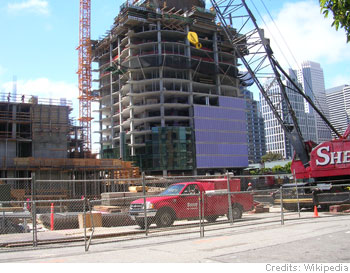 California is talking about creating a “green” building code. I will put aside the question of whether a green building code is a good idea in the long run. If there is going to be a green building code, is now the time to start (rather than wait until after the recession)? Is California the place to start?
California is talking about creating a “green” building code. I will put aside the question of whether a green building code is a good idea in the long run. If there is going to be a green building code, is now the time to start (rather than wait until after the recession)? Is California the place to start?
Note that real estate prices have been much lower during this recession than before, especially in California. The low real estate prices (more specifically, the underwater mortgages associated with them) are responsible for a large fraction of our economy’s poor performance of late.
Also note that a green building code raises the cost of building new structures (if green building were costless, then there’s no need for a government mandate!), and perhaps adding on to existing ones.
Existing structures compete with new structures in the marketplace, so introducing a green building code would raise the value of existing structures by raising the cost of building new ones. It will mean less construction output (and less living in a region with a green building code), which will depress land prices. It will even depress the value of land that has an existing useful structure, although the green code would increase the combined value of that parcel of land and its structure.
There will be less construction output, but possibly more construction input, depending the price elasticity of the demand for living in the region. Thus, a green building code would not necessarily reduce construction employment.
By raising the value of property with existing and useful structures, this could help alleviate one of the major problems in our economy (one offset is that some properties do not have a useful structure, and a green code would put mortgages on them even further under water), especially in California (less so in Nevada or Arizona, were the percentage of mortgaged properties with existing structures may be lower). So now may be the time for a green building code in California.


Leave a Reply